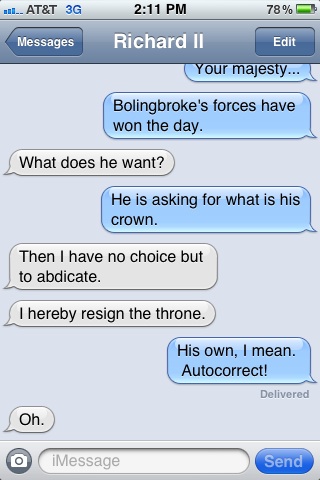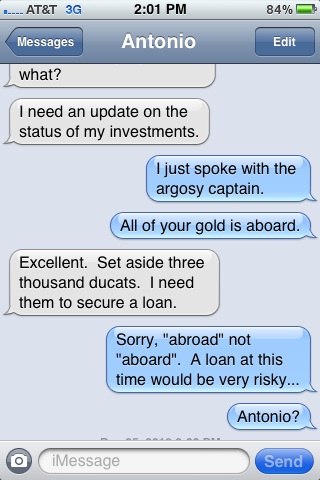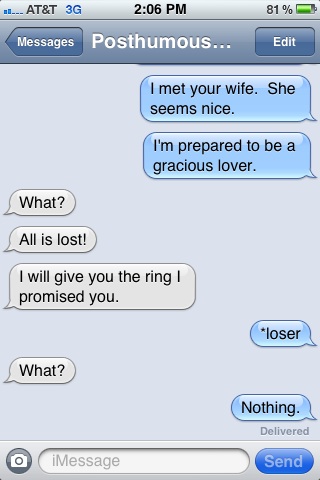Over at Pursued by a Bear, Cassius put together a series of videos lauding Shakespeare’s Most Underrated Characters back while I was on hiatus. They’re definitely worth checking out. Even when you disagree with one of her choices, she makes a compelling case.
Still, she includes such “underrated characters” as Hamlet and Othello. And while I totally get that a character can be highly rated and yet underrated, a list like this is an opportunity to bench the starters and let the minor characters show their stuff. Basically, what I’m saying is, I want to play too. Now that I’m back, here is my list, with a hat tip to Cassius for the idea.
An old theatre maxim says there are no small parts, but below you’ll find some really outstanding exceptions. Some of them don’t even have names. If your reaction to seeing some of these is “Wait… who?” then I’ve done my job. But don’t dismiss them just yet; they’re on this list for a reason. Let’s start the countdown at 50.
50. Costard (Love’s Labour’s Lost) – With so many foolish characters in one play, it’s easy to overlook the actual clown. But Costard spins some impressively deft wordplay that puts more erudite characters to shame.
49. Pinch (The Comedy of Errors) – Just as things get about as silly as you think they could get, enter good Doctor Pinch. While others suspect Antipholus of mere madness, Pinch tries to exorcize Satan from within him.
48. Fluellen (Henry V) – The Welsh captain may speak his bombast with a funny accent, but he’s not a man to be trifled with. He bravely leads his troops into battle, and handles himself ably in private matters as well.
47. The Scottish Doctor (Macbeth) – A doctor is brought in to cure Lady Macbeth’s madness. Sadly, modern psychiatric practice would be far beyond the reach of Shakespeare’s England, let alone Macbeth’s Scotland.
46. Peter Quince (A Midsummer Night’s Dream) – It can’t be easy to construct a troupe of actors from weavers and tailors, but this is one carpenter who is up to the task. Ah, the joys of community theatre.
45. Antipholus of Ephesus (The Comedy of Errors) – The other three twins may have more stage time, but the funniest moments of the play come from the misfortunes that befall the local Antipholus.
44. Corin (As You Like It) – The old forest-dwelling shephard councils the younger love-struck Silvius, matches wits with Touchstone, and reminds us that courtly life isn’t better than the simple life, just different.
43. Antonio (Twelfth Night) – Sebastian’s savior and friend mentions that he happens to be a wanted criminal. But his love and loyalty prove to be powerful forces, as is his rhetoric when he thinks he’s been betrayed.
42. Paulina (The Winter’s Tale) – Hermione may have been the one to fake her death, but it’s Paulina who has to sell it. And sell it she does, without so much as flinching. Note to self: stay on Paulina’s good side.
41. Joan La Pucelle (1 Henry VI) – Joan of Arc, the peasant girl who led troops in winning great battles against the English, was a revered heroine among the French people. Of course, Shakespeare wasn’t French.
40. Oliver and Celia (As You Like It) – They seem like they’re going to be purely functional roles: Orlando’s evil brother and Rosalind’s supportive cousin. And then, boom, they meet and it’s love at first sight.
39. Chorus (Henry V) – The “muse of fire” prologue stands out, but the Chorus stays on the job throughout the play, adding vibrant imagery to expand the theatrical experience beyond the limitations of the stage.
38. Adam (As You Like It) – Rather than embody the bleak vision of Jacques’s last age of man, the spry Adam warns Orlando of the plot against him and faithfully agrees to serve him in exile. Eighty years young!
37. Pompey (Measure for Measure) – Not quite Pompey the Great, his bum is the greatest thing about him. Sent to prison, the former brothel bartender feels right at home among his old customers.
36. First and Second Lords (All’s Well That Ends Well) – This list has a soft spot for characters who aren’t even given names. The Lords are real characters that help advance the plot over multiple scenes. No respect!
35. Duke Senior (As You Like It) – A lesser man might be slightly annoyed by having his entire dukedom usurped. But Duke Senior takes “being a good sport” to a whole new level. And notice he’s not given a name either.
34. Charmian and Iras (Antony and Cleopatra) – When Cleopatra chooses to leave this world, she is flanked by her two most loyal servants – Iras just before and Charmian just after. Good help is hard to find.
33. Lord Stanley, Earl of Derby (Richard III) – Richard is so crazed with paranoia that when he accuses Stanley of betrayal, we completely believe the good earl’s denial. But wait… yeah, he went right to Richmond.
32. Archibald, Earl of Douglas (1 Henry IV) – “That sprightly Scot of Scots… that runs o’ horseback up a hill perpendicular” is outbattled by Hal, outwitted by Falstaff, and ultimately captured and released. Ah well.
31. Son and Father (3 Henry VI) – On the battlefield, Henry observes a son who has killed his father and a father who has killed his son. He thus realizes the heavy cost of the war, and his own responsibility for it.
30. The Thane of Ross (Macbeth) – Whether it’s victory in battle or the slaughter of your family, nobody delivers the news like the Thane of Ross, whatever his actual name may happen to be.
29. Roderigo (Othello) – Often overshadowed by the more dynamic characters in the play, Roderigo is a fantastic comic role. Hopelessly in love with Desdemona, Roderigo is an easy target for Iago’s machinations.
28. Iachimo (Cymbeline) – This “little Iago” deserves better than to be thought of as a diminutive derivative. But unlike his nefarious namesake, he never really meant any harm, and is honestly repentant at the end.
27. Lord (The Taming of the Shrew) – We remember Christopher Sly, but what of the Lord who devised the over-the-top prank in the first place. Actually, either one could make this list; they usually both get cut.
26. The Provost (Measure for Measure) – When the Duke realizes he can no longer implement his plan alone, he recruits the Provost, who proves to be an able accomplice. But why does he not have a name?
25. The Queen (Cymbeline) – She’s the classic fairy tale wicked step-mother, who even has the self-awareness to swear she isn’t. On her deathbed, she admits she never loved Cymbeline. It’s good to be the Queen.
24. The Earl of Suffolk (1 Henry VI) – He woos the young Margaret for the king, but has some grand designs of his own. “Margaret shall now be queen, and rule the king; But I will rule both her, the king, and realm.”
23. Casca (Julius Caesar) – Other characters consider him dull, blunt, and rude, but don’t take their word for it. I find Casca to be witty, wise, and shrewd. Read over his lines and decide for yourself.
22. Countess of Auvergne (1 Henry VI) – Talbot takes a break from invading France to be flattered by the noblewoman’s invitation to her house. It’s a trap, but she ends up having him over for Freedom Fries anyway.
21. Rumor (2 Henry IV) – Best. Prologue. Ever. The living embodiment of Rumor brags about the damage he’s done, while seamlessly bringing us up to speed on what’s happened since Part One. Open your ears.
20. Simpcox and Wife (2 Henry VI) – They are almost the definition of small Shakespearean roles. But their scene is genuinely laugh-out-loud funny. Go check it out!
19. Mariana (Measure for Measure) – She shows up late in the play, and even then she’s no more than a convenient plot device with very few lines of significance. But then the final scene arrives, and … wow.
18. The Bishop of Carlisle (Richard II) – Richard is defeated, and Henry would be King. Carlisle protests vigorously, describing exactly what will result. As Shakespeare and his audience know, he’s absolutely right.
17. Antonio (The Tempest) – I have to admit that some of the nobles from the boat tend to blend together for me, but Antonio, who usurped his brother Prospero, stands out as the most cold-blooded.
16. Moth (Love’s Labour’s Lost) – Compare Don Adriano de Armado and Moth with Zap Brannigan and Kif. Note that Kif’s first Futurama episode was entitled “Love’s Labour’s Lost in Space.”
15. Mistress Overdone (Measure for Measure) – She’s had nine husbands (“overdone by the last”) and this clear-eyed brothel owner still manages to run her business like a professional.
14. Gratiano (The Merchant of Venice) – It’s okay if you don’t remember. He’s the other guy, the one who ends up with Nerissa. But he’s also a really clever comic character who can be a lot of fun to play.
13. John Talbot (1 Henry VI) – He only appears in a couple of scenes, but Lord Talbot’s son can display valor and loyalty in rhymed couplets like nobody else.
12. Thersites (Troilus and Cressida) – Shakespeare describes him as “a deformed and scurrilous Grecian,” and that’s just in the Dramatis Personae.
11. Lord Chief Justice (2 Henry IV) – Henry V’s harsh denial of Falstaff overshadows the new king giving a high place of honor to the constable who chased him down throughout his wayward youth.
10. Doll Tearsheet (2 Henry IV) – Falstaff’s favorite prostitute knows how to handle herself in a bar fight. She gives Pistol a tongue-lashing he really should have had to pay for.
9. Apemantus (Timon of Athens) – Oh yeah, I went there. But you don’t have to read the whole play, just check out the mother joke in the first scene.
8. Pistol (Henry V) – The loudmouth soldier tends to get overshadowed by Falstaff. But his bombast can shatter the stage when he’s ready to discharge.
7. Domitus Enobarbus (Antony and Cleopatra) – He’s a loyal soldier who abandons Antony only because he can’t support his self-destructive behavior. When Antony returns his treasure, Enobarbus dies of shame.
6. Arthur (King John) – He has few scenes, despite being an important character to the plot. He makes the list for successfully appealing to the heart of a man who has been sent to murder him.
5. Lady Grey (3 Henry VI) – After her side has lost the war, the Widow Grey bravely stands up to the new King. He cannot intimidate her, so he marries her instead. She’ll be Queen Elizabeth in the next play.
4. Sir William Catesby (Richard III) – We remember the evil machinations of Richard and Buckingham, but Catesby is there with them every step of the way, and seems to have no conscience about it.
3. Tranio (The Taming of the Shrew) – It’s easy to forget about Tranio. But while his master is playing servant to win his one true love, Tranio’s the servant who is playing his master – the much harder role!
2. First Gravedigger (Hamlet) – Often dismissed as merely a comic character, the Gravedigger gives Hamlet a chance to reflect on matters of life and death, thus underscoring one of the major themes of the play.
1. Jack Cade (2 Henry VI) – He’s an unlikely claimant to the throne, but his populist rhetoric has the power to start a rebellion at least. This is, I believe, Shakespeare’s most underrated character.
And finally, I invite my friends at Pursued By a Bear to join me in awarding an honorable mention to the most awesome, most minor character in the entire canon…
THE BEAR!




